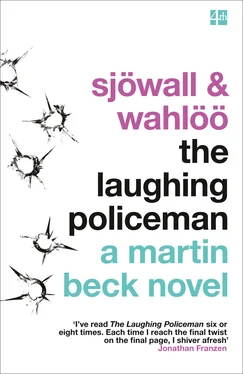MAJ SJÖWALL
AND PER WAHLÖÖ
The Laughing Policeman
Translated from the Swedish by Alan Blair

This novel is entirely a work of fiction. The names, characters and incidents portrayed in it are the work of the author's imagination. Any resemblance to actual persons living or dead, events or localities is entirely coincidental.
4th Estate
An imprint of HarperCollins Publishers Ltd. 1 London Bridge Street London SE1 9GF
www.harpercollins.co.uk
This ebook first published by Harper Perennial in 2007
This 4th Estate edition published in 2016
This translation first published by Random House Inc, New York, in 1970
Originally published in Sweden by P. A. Norstedt & Soners Forlag
Copyright text © Maj Sjöwall and Per Wahlöö 1968
Copyright introduction © Jonathan Franzen 2009
Cover photograph © Shutterstock
PS Section © Richard Shephard 2007
PS™ is a trademark of HarperCollins Publishers Ltd.
Maj Sjöwall and Per Wahlöö assert the moral right to be identified as the authors of this work
A catalogue record for this book is available from the British Library
All rights reserved under International and Pan-American Copyright Conventions. By payment of the required fees, you have been granted the non-exclusive, non-transferable right to access and read the text of this ebook on-screen. No part of this text may be reproduced, transmitted, down-loaded, decompiled, reverse engineered, or stored in or introduced into any information storage and retrieval system, in any form or by any means, whether electronic or mechanical, now known or hereinafter invented, without the express written permission of HarperCollins ebooks
HarperCollins Publishers has made every reasonable effort to ensure that any picture content and written content in this ebook has been included or removed in accordance with the contractual and technological constraints in operation at the time of publication
Source ISBN: 9780007242948
Ebook Edition © APRIL 2009 ISBN: 9780007323548
Version: 2016-10-13
From the reviews of the Martin Beck series:
‘First class’
Daily Telegraph
‘One of the most authentic, gripping and profound collections of police procedural ever accomplished’
MICHAEL CONNELLY
‘Hauntingly effective storytelling’
New York Times
‘There's just no question about it: the reigning King and Queen of mystery fiction are Maj Sjöwall and her husband Per Wahlöö’
The National Observer
‘Sjöwall/Wahlöö are the best writers of police procedural in the world’
Birmingham Post
Title Page
Copyright
Praise
Introduction
Chapter 1
Chapter 2
Chapter 3
Chapter 4
Chapter 5
Chapter 6
Chapter 7
Chapter 8
Chapter 9
Chapter 10
Chapter 11
Chapter 12
Chapter 13
Chapter 14
Chapter 15
Chapter 16
Chapter 17
Chapter 18
Chapter 19
Chapter 20
Chapter 21
Chapter 22
Chapter 23
Chapter 24
Chapter 25
Chapter 26
Chapter 27
Chapter 28
Chapter 29
Chapter 30
Keep Reading
About the Authors
Also by Maj Sjöwall and Per Wahlöö
About the Publisher
An actual Swedish person, my college roommate Ekström, introduced me to this book. He gave me a mass-market edition on whose cover was a cheesy photograph of a raincoated man in mod sunglasses pointing a sub-machine gun into the reader’s face. This was in 1979. I was exclusively reading great literature (Shakespeare, Kafka, Goethe), and although I could forgive Ekström for not understanding what a serious person I’d become, I had zero interest in opening a book with such a lurid cover. It wasn’t until several years later, on a morning when I was sick in bed and too weak to face the likes of Faulkner or Henry James, that I happened to pick up the little paperback again. And how perfectly comforting The Laughing Policeman turned out to be! Once I’d made the acquaintance of Inspector Martin Beck, I was never again so afraid of colds (and my wife was never again so afraid of how grouchy I would be when I got one), because colds were henceforth associated with the grim, hilarious world of Swedish murder police. There were ten Martin Beck mysteries altogether, each of them readable cover-to-cover on the worst day of a sore throat. The volume I loved best and reread most often was The Laughing Policeman . Its happily cohabiting authors, Maj Sjöwall and Per Wahlöö, had wedded the satisfying simplicities of genre fiction to the tragicomic spirit of great literature. Their books combined beautiful, deft detective work with powerful pure evocations of the kind of misery that people with sore throats so crave the company of.
‘The weather was abominable,’ the authors inform us on the first page of The Laughing Policeman ; and abominable it remains thereafter. The floors at police headquarters are ‘dirtied’ by men ‘irritable and clammy with sweat and rain.’ One chapter is set on a ‘repulsive Wednesday.’ Another begins: ‘Monday. Snow. Wind. Bitter cold.’ As with the weather, so with society as a whole. Sjöwall and Wahlöö’s negativity towards postwar Sweden – a theme in all ten of their books – reaches its delirious apex in The Laughing Policeman . Not only does the Swedish winter weather inevitably suck, but the Swedish journalists are inevitably sensationalist and stupid, the Swedish landladies inevitably racist and rapacious, the Swedish police administrators inevitably self-serving, the Swedish upper class inevitably decadent or vicious, the Swedish antiwar demonstrators inevitably persecuted, the Swedish ashtrays inevitably overflowing, the Swedish sex inevitably sordid or unappetizingly blatant, the Swedish streets at Christmastime inevitably nightmarish. When Detective Lennart Kollberg finally gets an evening off and pours himself a nice big glass of akvavit, you can be sure that his phone is about to ring with urgent business. Stockholm in the late sixties probably really did have more than its share of ugliness and frustrations, but the perfect ugliness and perfect frustration depicted in the novel are clearly comic exaggerations.
Needless to say, the book’s exemplary sufferer, Martin Beck, fails to see the humour. Indeed, what makes the novel so comforting to read is precisely its denial of comfort to its main character. When, on Christmas Day, his children play him a recording of ‘The Laughing Policeman’, in which the singer Charles Penrose gives out big belly laughs between the verses, Beck listens to it stone-faced while the children laugh and laugh. Beck blows his nose and sneezes, enduring an apparently incurable cold, smoking his nasty Floridas. He’s stoop-shouldered, grey-skinned, bad at chess. He has stomach ulcers, drinks too much coffee (‘in order to make his condition a little worse’), and sleeps alone on the living-room sofa (in order to avoid his nag of a wife). At no point does he brilliantly help solve the mass murder that’s committed in Chapter 2 of the book. He does achieve one valuable insight – he guesses which cold case a deceased young colleague has been reworking – but he neglects to mention this insight to anyone else, and by failing to perform a thorough search of his dead colleague’s desk he inflicts a month and a half of avoidable misery on his department. His most memorable act in the book is to prevent a crime, by removing bullets from a gun, rather than to solve one.
Читать дальше













